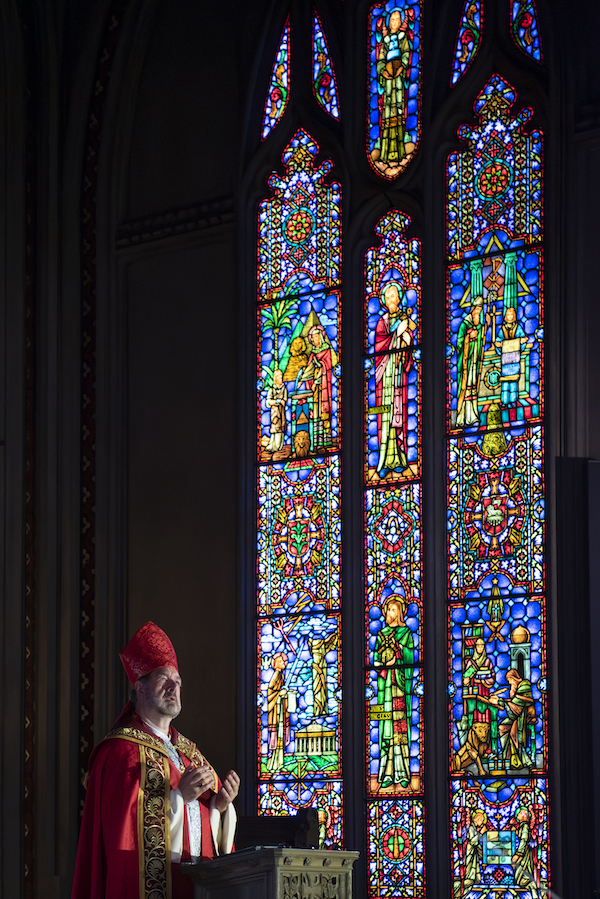Opera Festival of Chicago provides compelling local premiere for “Murder in the Cathedral”

Three months ago I wrote a column encouraging more enterprising efforts by newer and smaller opera companies to—at least in part—fill some of the gaping void on the local arts scene left by the continuing artistic decline of Lyric Opera.
The Opera Festival of Chicago appears primed to fill some of that gap. Now in its third season, the company is still in fledgling mode as a summer festival focused on lesser-known Italian repertoire. OFC is presenting two staged operas and a pair of concerts this summer. (Last year, the company mounted Rossini’s L’inganno felice and Verdi’s Il Corsaro.)
Based on the resounding success of OFC’s performance of Ildebrando Pizzetti’s Murder in the Cathedral, presented Thursday night at the Chicago Temple, this is clearly a young and ambitious company going in the right direction and fast.
The fact that OFC is bringing to Chicago audiences the belated local premiere of Pizzetti’s Assassinio nella Cattedrale—65 years after its debut—makes their efforts even more laudable.
Unveiled at La Scala in 1958, Pizzetti’s Murder in the Cathedral is a close setting of T.S. Eliot’s 1935 play of the same name. The drama is based upon the assassination of Archbishop Thomas Becket at Canterbury Cathedral in 1170 by knights close to King Henry II, with whom Becket was in open political conflict. The opera is faithful to Eliot’s play, occasionally to its detriment, with a lack of stage action and long, somewhat talky monologues. One can deduce the likely reasoning of unimaginative Chicago presenters for their long neglect of this opera: too short (83 minutes), too unusual, and too Catholic.
But Pizzetti’s music, scored for large orchestra, is glorious—consistently sensitive to the drama, skillfully scored and written in a taut yet lyrical style that rises to majestic and often strikingly beautiful heights. Along with his Missa di Requiem, Assassinio stands high among Pizzetti’s masterworks.
It was a great disappointment that the distinguished Ferruccio Furlanetto withdrew from playing the lead role of Thomas Becket in these performances. (He is still scheduled to perform a recital for the festival July 13 at the Harris Theater.)
One must be grateful to Andrea Silvestrelli for learning the challenging role of Becket on short notice and performing it for the first time in this Chicago premiere. Silvestrelli’s bass is an acquired taste to say the least—boomy, cloudy in diction and frayed around the edges.
While he was stretched in the role’s (mercifully brief) higher tessitura, Silvestrelli did nearly all else that was required vocally. The towering Italian singer brought surprising dramatic conviction to the role of the conflicted Becket—making manifest his struggle with pride, as well as the martyred priest’s defiant courage in refusing to lock the church doors for his own safety from the assassins. (Silvestrelli will also sing the title role in Verdi’s Attila later this month for OFC.)

The downtown Chicago Temple proved a visually and dramatically apt setting for Pizzetti’s opera, with the summer evening light filtering in evocatively through the tall stained-glass windows. Unfortunately, the architecturally significant venue is one of those rare church acoustics that are ungrateful for opera voices.
Soprano Maria Kanyova as the First Coryphée—leader of the large female chorus—was underprojected in Act 1, yet sang with greater clarity and impact in her solo opening the final act. The fine mezzo-soprano Anna Lorenzo made one wish she had more music to sing as the Second Coryphée.
If the devil gets the best tunes in opera, the villains had some of the best voices in this production as the murderous Knights (who double as Tempters of Becket).
Apart from his goofy twirling about as a Tempter, Reuben Lillie showed a vibrant and penetrating tenor as the First Knight. Equal standouts as his fellow conspirators were Eric Dubin, William Powell III, who displayed a commanding bass-baritone, and a dramatically arresting Patrick Blackwell.
The female chorus has a prominent role representing the religious women of Canterbury. Under the direction of Reid Taylor, the ensemble fulfilled its Greek chorus assignment effectively and brought rich, full-bodied impact to the opera’s climaxes.
Director Sasha Gerritson made resourceful use of the small space—made tighter still with the large orchestra in front— by deploying the Herald and, at times, the Knights in the nave. She also moved the singers on and offstage gracefully and efficiently.
Mike Goebel’s painterly lighting design was a major contribution to the success of this staging. His minimalist lighting in Act 1 allowed the stained glass illumination to make a magical effect. Saving strong colors for crucial moments—Lenten purple for spiritual heights and sudden, blood-red lighting at Becket’s murder— provided an effective visual counterpoint to the stage action.
Music director Emanuele Andrizzi showed great sympathy for this compelling score, leading a fluent, surging performance, searingly dramatic or glowingly radiant as required. Lyric Opera concertmaster Robert Hanford was an effective leader in the first chair and James Kim contributed a mellifluous English horn solo in the Intermezzo.
Pizzetti’s underrated opera deserves to be heard and kudos to Opera Festival of Chicago for finally bringing it to underserved local audiences.
Other Opera Festival of Chicago events include an “Italian Soiree” concert July 12 with Silvestrelli and other singers, a recital by Ferruccio Furlanetto July 13, and Verdi’s Attila July 20 and 23. operafestivalchicago.org